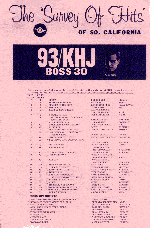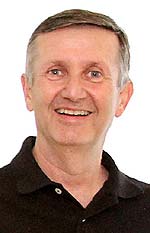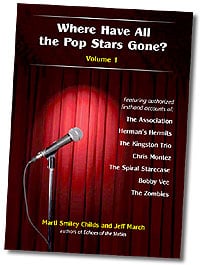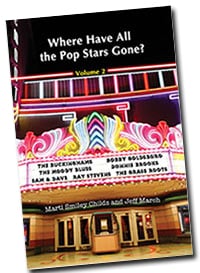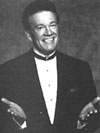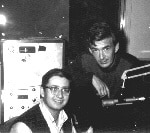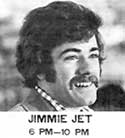The Jeff March Collection
After abandoning an oldies format, KXOA-FM switched to a Top 40 format in 1974 in the hope of challenging AM Top 40 leaders KROY and KNDE. In an era in which stations proudly announced their call letters, KXOA-FM called itself K-108.
Although KXOA would again change format to a very successful “mellow rock” approach within two years, Dusty Morgan remained with the station into the 90’s.
In 1974, KXOA-FM was owned by Brown Broadcasting, who also owned KGB in San Diego. Top 40 on FM was very progressive for Sacramento at the time, and few know that it was initiated by Ron Jacobs. Jacobs writes:
“In exchange for a 1973 Chevy pickup (which was sent to Maui) I went there (to Sacramento) and ‘installed’ some of the stuff that worked at KGB. Have no idea who was doing the jingles for the station then. I wasn’t there on a regular basis programming it, so I never mention it. Other than that cheap copout, there could’ve been endless other factors such as signal strength, promo budget, etc. My attitude was, ‘Show me the Chevy’…”
Sacramento didn’t have a dominant “Top 40/CHR” format on FM until the early ’80’s (FM102).
– Uncle Ricky
As rival KRLA was enjoying a surge of popularity through its association with the Beatles, and as newcomers KHJ and KBLA began pumping up the volume, KFWB tried to stay the course with its traditional format upon which it had relied successfully for years.
Morning drive man Wink Martindale led off the lineup of the KFWB “Good Guys” who also included Hal Pickens (9 a.m.-noon, one set from Hal is heard at the end of this aircheck), Don MacKinnon (noon-3 p.m., killed in June 1965 in an automobile crash), Gene Weed (3-6 p.m.), B. Mitchel Reed (6-9 p.m., d. 1983), Reb Foster (9-midnight) and Larry McCormick (midnight-6 a.m.).
Additionally featured in this half hour (8:30 – 9:00 am, 6/2/65) is long-time L.A. news reporter Beach Rogers; also, a very stylish spot for Winston cigarettes.
Tom Clay was an extraordinary disc jockey and an extraordinary human being. He was extraordinary in the sense that his program did not follow the norm. He did not do the ordinary. He was an exceptional story-teller, and he interspersed the records he spun with tales of the experiences that shaped his life. His program was different. It was dimensional. It was not for everyone. Tom Clay came from the Detroit market, where he’d worked at WJBK. He was in the starting lineup (with Humble Harve, included on this aircheck with a promo for his morning show) of the top 40 format that KBLA Burbank unveiled in February 1965, just a few months before Boss Radio broke big-time in Los Angeles. At the time of this aircheck, Boss Radio was less than two weeks old.
Until that time, KBLA operated invisibly on 1490 kHz with 250 watts. Although it was within the Los Angeles metropolitan area, few knew the station existed. Then the station was awarded a construction permit to shift to 1500 kHz with 10 kilowatts days, 1 kilowatt at night and an absolutely abysmal coverage pattern by virtue of its transmitter locationâ€â€clinging to the side of a barren mountain above Burbank. The signal nulled in the parking lot of the station at 131 E. Magnolia, within view of the towers. Nevertheless, Tom Clay held forth with his “Words and Music” program 4-8 p.m. nightly. The KBLA experiment lasted only two years, but enjoy it at its best on this Tom Clay aircheck.
And I have a Tom Clay story of my own to tell. When I was a high school kid, enamored with radio, he allowed me to visit him in the studio. We talked radio, careers, technique…and then, while a record played, he stood up and invited this starry-eyed kid–me– to sit in the chair at the console. And he said to me, “You know what? I’ll bet one day you’ll be sitting here in this studio at the controls.” I forgot about that comment until a phone call I received in 1970 from IBEW (International Brotherhood of Electrical Workers). At that time I was working part-time as an engineer at KIEV in Glendale, the neighboring community. The union asked if I’d like to take a regular shift as a studio engineer for the west coast feed of the Mutual Broadcasting System –working at the old studios of KBLA (by then known as KBBQ). I wound up running the board literally across the glass from the studio in which I’d visited Tom Clay five years earlier.
Dave Hull, who early in 1964 toiled 9-midnight on KRLA (1110 kHz, 50kw D/10kw N‗the big 11-10, serving Greater Los Angeles from Pasadena”), soared to prominence after closely identifying himself with Beatlemania. Shifted quickly to afternoon drive, Hull tossed out the regular playlist and cleared a path for the main forces of the British invasion.
The “Hullaballooer” punctuated his show with Beatle interview drop-ins and blasts from his hoarse-sounding India taxicab horn. As the screams of Beatlemania faded away with the Fab Four’s farewell concert tour in the summer of 1966, KRLA shifted from its traditional top 30 “Tune Dex” to a short lived all-request format. In that summer of ’66, KRLA held strong, blaring Donovan, the Kinks and the Fab Four from tinny 6-transistor radios dotting the beaches of Southern California from Malibu to Laguna. This aircheck (4-5 PM, August 18, 1966) captures Dave Hull in top form, his ties to the Beatles still strongly evident.
Also included: Danny Baxter with sports, and Jim Steck with an excellent long newscast. A ‘scoped version of this exhibit was originally published on August 31, 1997. A new transfer of the original exhibit, and a restored version of this exhibit was published on July 26, 2015.
Although Bill Ballance’s reign on Southern California’s airwaves has spanned five decades, he is best remembered for his days with KFWB (Los Angeles, 980 kHz, 5 kw fulltime).
When I first started listening to Top 40 radio, one of the first voices I heard was that of Bill Ballance. This was an era when rocket launches made lead stories, when American troops in Vietnam were still euphemistically called “military advisors,” and when Top 40 stations aired patriotic messages.
Listen in particular to the chilling introduction of the President of the United States on this Espanol-laced, ebullient, billowing, bombastic, boisterous Bill Ballance program from December 1961.
KENO (“color radio channel 146”) was a wonderful station with a lively presentation and a slate of talented personalities who routinely dominated the market with shares in the 30s. Of course, Vegas in the mid-1960s had only seven AMs and three FMs.
But in 1965, KENO (1460 kHz, then 1 kw fulltime) ran the only top 40 format in town, and it owned the market. Coffee Jim Dandy, who did morning drive (6-10 a.m.) weekdays, is heard here in the sixth hour of a Saturday morning 6-noon stint.
[ORIGINAL DESCRIPTION BY CONTRIBUTOR JEFF MARCH.]
Until the spring of 1965, KHJ was one of perhaps nine traditional MOR (middle-of-the-road) stations doing the same old thing in L.A. KHJ’s fare included a nightly folk music program hosted by British announcer Michael Jackson (later to gravitate to talk radio at KABC). The debut of KHJ’s polished “Boss Radio” format in April 1965 turned L.A. radio on its ears.
By the summer of ’66, simulcasting KHJ not only had shaken the AM radio establishment but presaged the awakening of FM for youth-oriented formats. While 93/KHJ drive anchors Robert W. Morgan and The Real Don Steele were permitted little adjustments in formatics to express their personas, the other Boss Jocks just hammered out straight-on Boss Radio. Such was the case with Frank Terry, captured on this aircheck taped during KHJ’s heyday in September 1966.
Frank Terry passed away June 21, 2007, following a ten-year battle with cancer. Gary Mack, who is featured for the last 19 minutes of this recording, went into broadcast management at WSB, Atlanta.
[TECHNICAL NOTE: The UNscoped version includes a burst of hiss from an unknown source. It begins at approximately 41:05 and continues until 42:50, during the Art Kevin news. This flaw was in the original recording.]
There was no other like Dr. Don Rose. A mainstay in Philadelphia, Dr. Don brought his high-energy antics to San Francisco’s KFRC (610 kHz, 5 kw fulltime) in the mid ’70s. Dr. Don rapid-fired one-liners like a gatling gun, launching barrages of material that others would have doled out over entire shifts. I interviewed Dr. Don for a magazine article in 1979 and found him to be gracious, warm, self-effacing, and as humorous off-air as he was on.
Don Rose passed away March 29, 2005.
but he wrote it was recorded on Sunday, March 24, 1974. I am left to suggest that you listen to this wonderful retro-Top-40 from an unknown host named Jimmy Jet on KYA in 1974.
Russ “The Moose” Syracuse was the first pilot of Flight 1260, but apparently, 1974 was the “Jet Age”.
It’s almost like Boss Radio didn’t happen, and competitor KFRC didn’t exist. It’s “People Power KYA” and Pilot Jimmy is using drops and bits like it’s 1959 – This is truly one of the most unusual 1974 airchecks we’ve ever heard. We even have a high school
kid reporting the Top Five, and a produced intro for a musical feature called Cable Car Cluster. Most jocks (and Program Directors) had forgotten how to do this kind of Top 40 radio in 1974. And yet, here it was. And who was Jimmy Jet, and where is
he today?

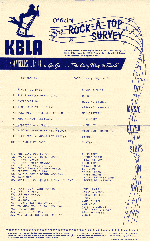 KBLA "Rock-A-Top" Survey, July, 1965
KBLA "Rock-A-Top" Survey, July, 1965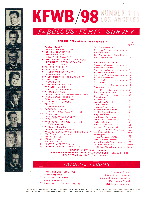 KFWB "Fabulous 40", June, 1965
KFWB "Fabulous 40", June, 1965